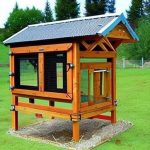Keeping chickens has become increasingly popular in recent years, and for good reason. Not only do chickens provide fresh eggs, but they also offer a range of other benefits. They can help control pests in your garden, provide natural fertilizer for your plants, and even serve as friendly and entertaining pets. With these advantages in mind, many people are considering the idea of keeping chickens in their own backyard.
One place where this trend is gaining traction is in Kailua, Oahu. Kailua is a beautiful town located on the eastern coast of Oahu, known for its stunning beaches and laid-back atmosphere. The warm climate and abundant greenery make it an ideal location for keeping chickens. In this article, we will explore the possibility of keeping chickens in Kailua and provide you with all the information you need to get started.
Key Takeaways
- Keeping chickens in Kailua, Oahu is a possibility worth exploring.
- Understanding the legalities and obtaining permits is crucial before raising chickens in Kailua.
- Choosing the right breed of chickens suitable for Kailua’s climate is important.
- Building a safe and comfortable coop for your chickens is essential for their well-being.
- Providing a balanced diet and maintaining good health and hygiene practices are necessary for your chickens’ health.
Understanding the Legalities: Permits and Regulations for Raising Chickens in Kailua
Before you embark on your chicken-keeping journey, it is important to understand the legal requirements for raising chickens in Kailua. The first step is to check with your local government or municipality to determine if there are any specific regulations or permits required for keeping chickens.
In Kailua, there are certain regulations that must be followed when keeping chickens. For example, there may be restrictions on the number of chickens you can keep, as well as guidelines for coop size and placement. It is important to familiarize yourself with these regulations to ensure that you are in compliance.
To obtain the necessary permits, you may need to submit an application and pay a fee. The application process typically involves providing information about your property, such as its size and location, as well as details about your intended coop design and chicken-keeping practices. It is important to carefully read and follow all instructions provided by the local government to ensure a smooth application process.
Choosing the Right Breed: Factors to Consider for Selecting Chickens Suitable for Kailua Climate
When it comes to selecting chickens for your backyard flock in Kailua, it is important to choose breeds that are well-suited to the local climate. The warm and tropical climate of Kailua can be challenging for some chicken breeds, so it is important to consider factors such as heat tolerance and resistance to common diseases.
There are many different breeds of chickens to choose from, each with its own unique characteristics. Some breeds are known for their heat tolerance, while others are better suited to colder climates. It is important to do your research and select breeds that will thrive in the Kailua climate.
In addition to climate considerations, you may also want to consider other factors such as egg production, temperament, and appearance. Some breeds are known for their high egg-laying potential, while others are prized for their friendly and docile nature. Ultimately, the choice of breed will depend on your personal preferences and goals for keeping chickens.
Housing and Coop Design: Tips for Building a Safe and Comfortable Home for Your Chickens
Once you have selected the right breed of chickens for your backyard flock in Kailua, it is time to think about housing and coop design. A well-designed coop is essential for providing a safe and comfortable home for your chickens.
When designing your chicken coop, there are several important factors to consider. First and foremost, the coop should provide adequate space for your chickens to move around comfortably. The general rule of thumb is to allow at least 4 square feet of space per chicken inside the coop, and 10 square feet per chicken in the outdoor run.
The coop should also be well-ventilated to ensure good air circulation and prevent the buildup of moisture and ammonia. This can be achieved by incorporating windows or vents into the design. Additionally, the coop should be predator-proof, with secure fencing and locks to keep out unwanted visitors.
Feeding and Nutrition: What to Feed Your Chickens and How to Ensure a Balanced Diet
Proper nutrition is essential for the health and well-being of your chickens. A balanced diet will not only ensure that your chickens are healthy, but it will also contribute to the quality of their eggs.
Chickens are omnivores and require a combination of grains, protein, vitamins, and minerals in their diet. A good quality commercial chicken feed is a convenient option that provides all the necessary nutrients in the right proportions. However, it is also important to supplement their diet with fresh fruits and vegetables, as well as occasional treats such as mealworms or kitchen scraps.
In addition to providing a balanced diet, it is important to ensure that your chickens have access to clean and fresh water at all times. Water is essential for digestion, egg production, and overall health. Make sure to regularly clean and refill their water containers to prevent the growth of bacteria.
Health and Hygiene: Essential Practices for Maintaining Good Health and Hygiene of Your Chickens

Just like any other pets or livestock, chickens can be susceptible to various health issues. It is important to be proactive in maintaining good health and hygiene practices to prevent the spread of disease among your flock.
Regularly inspect your chickens for signs of illness or injury, such as lethargy, loss of appetite, or abnormal droppings. If you notice any concerning symptoms, it is important to consult a veterinarian who specializes in poultry health.
Maintaining good hygiene in the coop is also crucial for preventing the spread of disease. Regularly clean out the coop and remove any soiled bedding or droppings. Provide fresh bedding material on a regular basis to keep the coop clean and dry.
Egg Production: Maximizing Egg Laying Potential of Your Chickens in Kailua
One of the main reasons people choose to keep chickens is for the fresh eggs they provide. If you are interested in maximizing egg production in your flock, there are several strategies you can employ.
First and foremost, make sure your chickens have access to a high-quality diet that is rich in protein and nutrients. A balanced diet will provide the necessary building blocks for egg production.
Provide your chickens with a comfortable and stress-free environment. Chickens that are stressed or uncomfortable may not lay as many eggs. Make sure they have enough space, proper ventilation, and access to fresh water and food at all times.
Finally, consider adding supplemental lighting to your coop. Chickens require a certain amount of daylight to stimulate egg production. By adding artificial lighting, you can extend the number of daylight hours and encourage your chickens to lay more eggs.
Dealing with Predators: Strategies for Protecting Your Chickens from Predators in Kailua
Predators can pose a significant threat to your backyard flock, especially in an area like Kailua where there is a diverse range of wildlife. It is important to take steps to protect your chickens from potential predators.
Common predators that may threaten your chickens in Kailua include raccoons, rats, cats, and even larger birds such as hawks or owls. To protect your flock, make sure your coop is secure with sturdy fencing and locks. Consider burying wire mesh around the perimeter of the coop to prevent predators from digging under.
You can also use deterrents such as motion-activated lights or sprinklers to scare away potential predators. Additionally, providing your chickens with a safe and enclosed outdoor run can give them the opportunity to enjoy some fresh air and exercise while still being protected from predators.
Community Engagement: Building Positive Relationships with Neighbors and Community Members
When keeping chickens in a residential area like Kailua, it is important to build positive relationships with your neighbors and community members. This can help prevent any potential conflicts or complaints and create a sense of community around your chicken-keeping endeavors.
Start by informing your neighbors about your plans to keep chickens and address any concerns they may have. Be open to answering questions and providing information about the benefits of keeping chickens. Consider inviting your neighbors over for a visit to see your coop and meet your chickens.
You can also engage with the wider community by participating in local events or organizations related to sustainable living or urban farming. Share your experiences and knowledge with others who may be interested in keeping chickens or starting their own backyard farm.
The Rewards and Challenges of Keeping Chickens in Kailua, Oahu
Keeping chickens in Kailua, Oahu can be a rewarding and fulfilling experience. Not only do chickens provide fresh eggs, but they also offer a range of other benefits such as pest control and natural fertilizer for your garden. However, it is important to be aware of the challenges that may arise when keeping chickens in a residential area.
Understanding the legal requirements, selecting the right breed, providing proper housing and nutrition, maintaining good health and hygiene practices, protecting against predators, and building positive relationships with neighbors and community members are all essential aspects of successful chicken-keeping in Kailua.
By following these guidelines and being proactive in caring for your flock, you can enjoy all the benefits that come with keeping chickens while contributing to a more sustainable and self-sufficient lifestyle.
If you’re considering keeping chickens in Kailua, Oahu, you may be interested in learning how to turn a shed into a chicken coop. This article from Poultry Wizard provides a step-by-step guide on transforming a shed into a comfortable and functional space for your feathered friends. From insulation and ventilation to nesting boxes and roosting bars, this resource covers all the essentials for creating a cozy home for your chickens. Check out the article here to get started on your chicken-keeping journey in Kailua, Oahu.
FAQs
Can you keep chickens in Kailua, Oahu?
Yes, it is legal to keep chickens in Kailua, Oahu, as long as certain regulations are followed.
What are the regulations for keeping chickens in Kailua, Oahu?
According to the City and County of Honolulu’s Department of Planning and Permitting, residents can keep up to five chickens on their property as long as they are kept in a coop or enclosure that is at least 20 feet from any neighboring dwelling.
Do I need a permit to keep chickens in Kailua, Oahu?
No, a permit is not required to keep chickens in Kailua, Oahu, as long as the regulations are followed.
What types of chickens are allowed in Kailua, Oahu?
There are no specific restrictions on the types of chickens that can be kept in Kailua, Oahu.
What are the benefits of keeping chickens in Kailua, Oahu?
Keeping chickens can provide a source of fresh eggs, fertilizer for gardens, and can be a fun and educational hobby for families.
What are the potential drawbacks of keeping chickens in Kailua, Oahu?
Chickens can be noisy and may disturb neighbors if not kept in a proper enclosure. They also require daily care and maintenance, including feeding, cleaning, and protection from predators.
Meet Walter, the feathered-friend fanatic of Florida! Nestled in the sunshine state, Walter struts through life with his feathered companions, clucking his way to happiness. With a coop that’s fancier than a five-star hotel, he’s the Don Juan of the chicken world. When he’s not teaching his hens to do the cha-cha, you’ll find him in a heated debate with his prized rooster, Sir Clucks-a-Lot. Walter’s poultry passion is no yolk; he’s the sunny-side-up guy you never knew you needed in your flock of friends!







